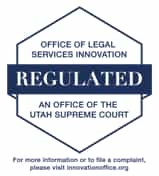Utah Trust Administration & Probate Lawyers
Guidance With Legal Issues After a Loved One’s Passing
The death of a loved one is a time of stress and sadness. You must cope with planning a funeral, readjusting to life without your relative, and finding your new normal. Unfortunately, you also must cope with complex legal proceedings to make it possible to transfer the assets of the deceased.
The two processes most likely to be used to transfer assets after a death in Utah are trust administration and probate. Pearson Butler can help you through both processes. The firm’s skilled lawyers take care of the legal needs of executors, personal representatives, trustees and trust administrators, beneficiaries, and heirs.
The Utah probate attorneys at Pearson Butler can provide personalized advice and answer to such questions as:
- What are trust administration and probate?
- Who should get legal help with trust administration or probate?
- What can a lawyer do to help?
For more information, continue reading or contact Pearson Butler at (800) 265-2314 for a confidential assessment of your specific situation and needs.
What Are Trust Administration & Probate?
Both trust administration and probate are legal processes required under Utah law to facilitate asset transfer after a death. In most situations, a property owned by someone who has passed away does not automatically go to new owners, even if the deceased person has made clear who those new owners should be. Steps must be taken to value the property, make sure the deceased person’s wishes are respected, pay taxes owed on the estate, and give creditors a chance to make claims.
The specific process that will be used to transfer the deceased person’s assets varies based on whether the deceased created a trust, wrote a will, or made provisions to avoid probate. Trust administration will take place only if the deceased person created a trust document. Probate, on the other hand, is a common process that occurs after many deaths—unless the deceased took steps to avoid it.
How Are Probate & Trust Administration Different?
Probate and trust administration are different in important ways, including court involvement. While the probate court oversees the probate process, the trustee named in the trust creation document handles the trust administration process on his/her own unless there is a problem.
The trust administration process can be faster, easier, and more private than probate. However, there are also similarities between trust administration and probate, as both processes are designed to wind up the deceased person’s affairs and ensure new owners get the property that serves as their inheritance.
Navigating trust administration and probate can be very difficult, as you try to learn legal language and make sense of Utah law while also dealing with the other issues that a death creates. A skilled trust administration and probate lawyer can help.
Who Should Get Legal Help with Trust Administration or Probate?
Those who are given the responsibility of managing and overseeing the trust administration and probate processes can benefit greatly from legal help as they fulfill their roles.
Generally, a trustee is responsible for making sure that the trust administration process works properly. An executor named in the will performs the role of managing the probate process, unless the executor declines and a personal representative is appointed by the probate court.
Trustees, executors, and personal representatives not only have to go through the formal trust administration and probate steps, but they also must manage the deceased person’s assets while they do so. Taking on these tasks can be very challenging, but an attorney can manage the legalities of probate and trust administration for you.
Those who stand to inherit from a will or trust will also want to consider getting legal help. An attorney can assist in protecting an inheritance and making sure that the proper processes are occurring in a timely manner to protect the inheritance and facilitate the transfer of assets to new owners.
Finally, if you are considering contesting a trust or a will, getting legal help is essential to determine if you have legal grounds to argue against enforcement.
When Should a Personal Representative Consult a Utah Probate Attorney?
On the Utah Court’s website, the Utah State Bar recommends that a Utah attorney be consulted when:
- The gross value of your estate, including life insurance, employer death benefits, and anything you might inherit from your spouse or others, exceeds $600,000.
- Where there are businesses or partnerships involved.
- Where there might be substantial conflict among the heirs.
- Where there are any other unusual or bothersome circumstances.
- Where one or more of your heirs may have trouble managing their affairs due to age, infirmity, improvidence, lack of training, or simply lack of desire.
How Can an Attorney Help?
A Utah trust administration and probate lawyer at Pearson Butler can provide you with invaluable guidance regardless of your role after a loved one’s death. The firm helps clients comply with the law and their obligations to the deceased. When you work with Pearson Butler, you can rest assured that your lawyer will go above and beyond to protect your inheritance and the wishes of your lost loved one.
To find out more about the ways an attorney can help after someone you care about has passed away, call (800) 265-2314 or contact Pearson Butler online.





.jpg)








